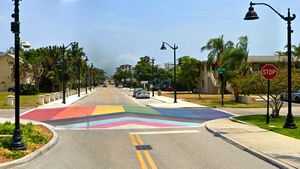
Treatment GuideJust DiagnosedSex & DatingAfrican AmericanStigmaAsk the HIV DocPrEP En EspañolNewsVoicesPrint IssueVideoOut 100
CONTACTCAREER OPPORTUNITIESADVERTISE WITH USPRIVACY POLICYPRIVACY PREFERENCESTERMS OF USELEGAL NOTICE
© 2025 Pride Publishing Inc.
All Rights reserved
All Rights reserved
Scroll To Top
By continuing to use our site, you agree to our Privacy Policy and Terms of Use.
A few weeks after settling into the New Year sometimes means evaluating if you are accomplishing what you set out to. Most people make some resolution to become more physically fit, and there are many ways to do that. Getting into (or back to) healthier eating and exercising routines is an important part of sloughing off extra pounds. One of the benefits of getting back to a good weight is the reduction of your risk for chronic conditions that are so common in the Western world, such as diabetes, cardiovascular disease, and hypertension, or high blood pressure. When it comes to high blood pressure you may not generally feel much different. Still, it is an important risk factor for cardiovascular disease, and it affects kidney function. While being HIV-infected has not been identified as a specific risk for hypertension on its own, many of the surrounding changes that happen with chronic HIV infection can put you at higher risk. At least one report has concluded that using highly active antiretroviral therapy that includes protease inhibitor or nonnucleoside analogue medications could be related to an increase in blood pressure. Even insulin resistance, which is fairly common in chronic HIV infection, can lead to the development of salt-related high blood pressure; insulin resistance plus a high sugar intake can cause you to retain sodium and makes you a candidate to develop salt-sensitive hypertension. Sodium itself does not seem to be the bad guy. Regular table salt is made up of sodium and chloride, and both are required to cause the hypertension effect in salt-sensitive people. Sodium bicarbonate and monosodium glutamate are nonchloride salts sometimes used in food processing, and they have not been found to increase blood pressure. Salt substitutes often contain a combination of potassium and chloride; even though the chloride is present, the absence of sodium in this salt may be the reason salt substitutes do not seem to contribute to high blood pressure. Even with high sodium chloride consumption, increased potassium intake may help to keep the hypertension effect in check. You will also want to keep your calcium intake at a good level. And while additional calcium beyond the recommended dietary intake levels does not seem to have a particularly beneficial effect on blood pressure, not getting enough can definitely have a detrimental effect. Alcohol can also feed into high blood pressure. People who consume three or more drinks per day (three beers, three glasses of wine, or three drinks with 1.5 jiggers of liquor each) can have a small but significant increase in blood pressure. People who reduce their alcohol intake can also reduce their blood pressure. Diets that are high in saturated fats are associated with high blood pressure, while diets high in omega-3 fatty acids are associated with lower blood pressure. In addition, if you are overweight or smoke, you are at higher risk for high blood pressure. So what can you do to? Make diet and exercise choices that help keep your blood pressure in check. ' Eat a variety of foods to make sure that you get a balanced supply of nutrients. ' Watch portion sizes to keep your weight in check. ' Shy away from the saturated fats and have fish or vegetarian sources of protein a couple of times or more a week. ' Reduce alcohol intake. ' Toss away your salt shaker in favor of herbs and spices to give you the flavor you crave, especially if you have insulin resistance or a current diagnosis of hypertension. ' Keep active and make a routine of exercise. ' Quitting smoking, as you would suspect, will get you farther down that healthy road than most anything else. Fields-Gardner is the director of services for The Cutting Edge, an HIV nutrition company in the Chicago area.
From our Sponsors
Most Popular
Lexi Love comes out as HIV+ after Trump deletes federal resources
January 23 2025 11:23 AM
Grindr is reminding us why jockstraps are so sexy and iconic
May 02 2025 5:36 PM
BREAKING NEWS: Trump admin moves to end federal HIV prevention programs
March 18 2025 6:10 PM
Trump's orders prompt CDC to erase HIV resources
January 31 2025 5:29 PM
Celebrating Black History Month with our annual African American issue
February 01 2025 3:28 PM
Tyler TerMeer vows to continue to fight for health care for all
January 28 2025 3:00 PM
Discover the power of Wellness in your life
March 26 2025 12:41 PM
Plus: Featured Video
Latest Stories
Dancer. Healer. Survivor. DéShaun Armbrister is all of the above
July 02 2025 8:23 PM
Two right-wing Supreme Court justices signal they may uphold access to PrEP and more
April 21 2025 4:10 PM
Broadway's best raise over $1 million for LGBTQ+ and HIV causes
April 03 2025 7:15 PM
Plus nominated for 2025 GLAAD Media Award
January 22 2025 12:42 PM
'RuPaul's Drag Race' star Trinity K Bonet quietly comes out trans
December 15 2024 6:27 PM
AIDS Memorial Quilt displayed at White House for the first time
December 02 2024 1:21 PM
BREAKING: Supreme Court rules to save free access to preventive care, including PrEP
June 27 2025 10:32 AM
1985: the year the AIDS crisis finally broke through the silence
June 26 2025 11:24 AM
Trump admin guts $258 million in funding for HIV vaccine research
June 03 2025 3:47 PM
500,000 Children at Risk: PEPFAR Funding Crisis
April 08 2025 3:51 PM
The Talk Season 5 premieres this spring with HIV guidance for the newly diagnosed
March 26 2025 1:00 PM
Jess King is here to help you live your happiest, healthiest life yet
March 24 2025 4:35 PM
A camp for HIV-positive kids is for sale. Here's why its founder is celebrating
January 02 2025 12:21 PM
VIDEO: A man living with HIV discusses his journey to fatherhood
June 10 2025 4:58 PM
HRC holds 'die-in' to protest Trump health care cuts
April 28 2025 2:11 PM
Season 4 of The Switch on resilience & radical self-love returns this spring
March 26 2025 12:20 PM
Gerald Garth is keeping people of color happy and healthy through trying times
March 11 2025 3:38 PM
This long-term HIV survivor says testosterone therapy helped save his life.
December 16 2024 8:00 PM
Ricky Martin delivers showstopping performance for 2024 World AIDS Day
December 05 2024 12:08 PM












































































